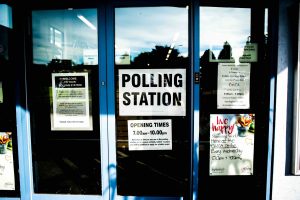 The battle for same-day voter registration in Chicago highlights some of the constitutional anomalies and controversies that have dogged the USA since its inception. All the judicial decisions made are subject to intense debate. There are those that believe in the absolute right to access the ballot regardless of the bureaucratic inconvenience that it causes. Others are of the view that if you really want to vote, then the government does provide avenues for you to vote. By the same token, if you fail to turn up, there is nobody but yourself to blame for that particular failing.
The battle for same-day voter registration in Chicago highlights some of the constitutional anomalies and controversies that have dogged the USA since its inception. All the judicial decisions made are subject to intense debate. There are those that believe in the absolute right to access the ballot regardless of the bureaucratic inconvenience that it causes. Others are of the view that if you really want to vote, then the government does provide avenues for you to vote. By the same token, if you fail to turn up, there is nobody but yourself to blame for that particular failing.
Meanwhile, the civil rights activists are up in arms about the possible exclusion of whole swathes of the populace who are simply unable to fulfill the bureaucratic requirements for voting in Chicago. The courts have traditionally been reluctant to create rights where none exist and also to prevent the use of arbitrary decision-making. One particular area of contention involves the perceived and actual differences between the rules that apply in rural areas of Illinois and those that are associated with the urban centers.
The Rationale for Voter Registration Law
Unsurprisingly, the courts have struck down those provisions that seem to create artificial and disempowering distinctions between communities. Those that believe in unhindered access to voting argue that there are communities whose special needs and preferences require that the authorities need to make appropriate adjustments. Whereas these adjustments may appear to be favoring one party over the other, they are actually essential in ensuring that most people who have a right and willingness to vote in Chicago eventually get to the ballot box. Same-day voter registration does have its benefits and demerits, after all.
Then, there is the legitimate concern about those who have no right to vote but who end up on the registers. Existing research and literature has found that these cases are few and far between. They are exaggerated for political capital, but in reality, they do not really change the outcomes of elections. Those who insist that they must also be considered on a matter of principle also forget that many of the adjustments came about as a consequence of a widespread culture of voter rights abuses in the USA. The Civil Rights era is no myth. It is rooted in the legal fabric of the state.
Punitive Measures Against Reluctant Voters
It is estimated that if everybody who is entitled to vote in US elections at all levels actually went ahead and voted, there would be a massive change in the political landscape. Parties that were seemingly invincible before would crumble under the weight of scrutiny from a public that would at last have the right to demand accountability. The current regime is considered by some to represent the consequences of not voting when you have a right to vote.
The political parties make hard-nosed political calculations about which options suit them best. In the simplest terms, these parties seek to maximize their core constituency votes whilst simultaneously minimizing those of others. That is why the same-day voter registration process and the debates that follow it typically reflect the partisan divide that is eating away at American politics today. There are no simple solutions because the vote is a hard-earned right that has taken centuries to perfect. It would be such a shame if Chicago in the modern day failed to provide the rights that were so fundamental to transforming America into the inclusive nation that it claims to be. If you need help on a case involved same-day voter registration in Chicago, contact David Freidberg Attorney at Law at 312-560-7100.
(image courtesy of Elliott Stallion)
 Chicago Criminal Lawyer Blog
Chicago Criminal Lawyer Blog


